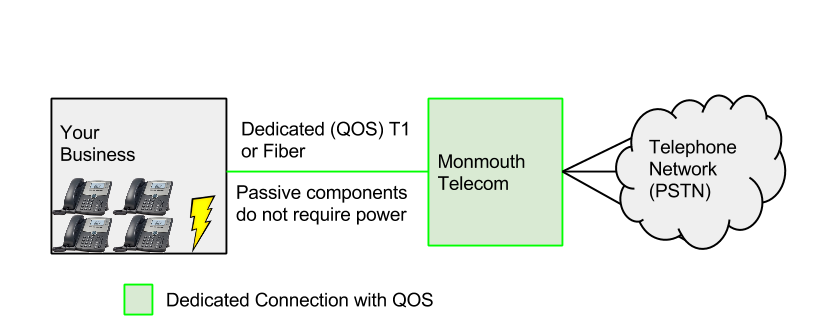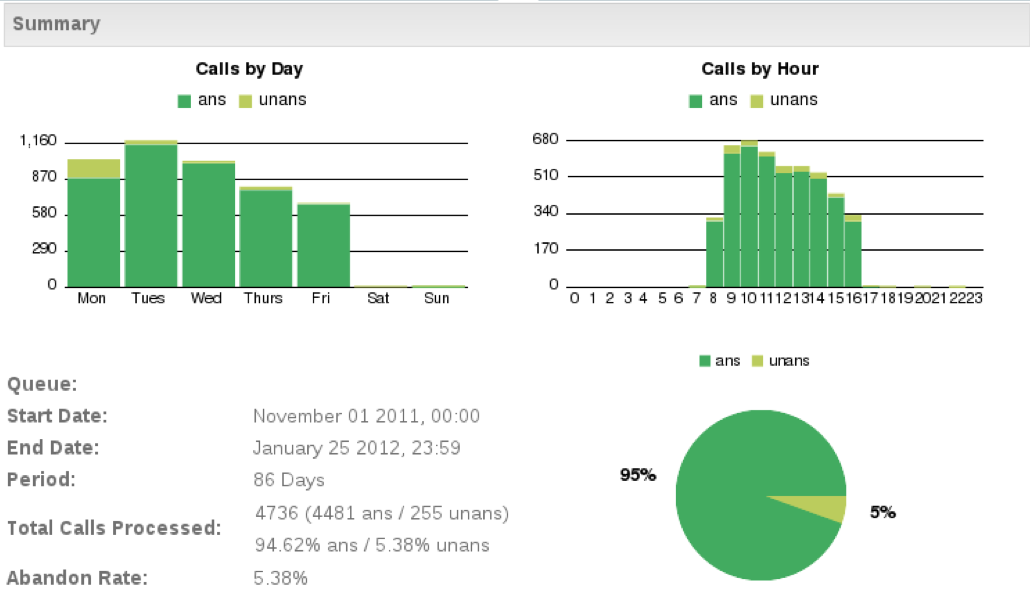You are here
The Limitations of BYOB (Bring Your Own Bandwidth) Hosted PBX
There are two ways to order Hosted PBX Service. One way is to order the service from an Internet Service Provider/Telephone Company who can provide you with a Dedicated Connection as well as the Hosted PBX Service. The other way is to order a broadband internet connection from an Internet Service Provider, and then order your Hosted PBX Service from a different company and reach your Hosted PBX Service over the public internet. Here we compare the merits of a Dedicated Internet Service, like T1 or Point to Point Fiber, with Shared Broadband Internet Service like Cable with specific regards to Cloud Based Phone Systems.
Summary
In this article we will explore the core differences in reliability between dedicated connections to your Hosted Voip Provider and Cable connections to your BYOB Hosted VoIP Provider. Before we can continue we must define several terms.
Definitions
QOS - Quality of Service or Packet Prioritization
QOS is the process by which certain types of traffic are prioritized over others. Phone conversations are very sensitive to communications issues, and have very stringent requirements with regards to the network transmissions. For this reason, voice traffic needs to "go to the front of the line" any time a line forms in the network. Without this prioritization phone calls can become impossible to understand.
Dedicated Connection - A dedicated connection has the following properties:
- QOS - QOS is available on dedicated connections
- symmetric speeds / full-duplex - this means that upload bandwidth and the download bandwidth is the same
- not affected by traffic utilization at other businesses - this means that your speeds are the same at all times of the day and at all times of the year
- service level agreement - the above two criteria are guaranteed by your contract
- predominantly used for business service
Examples:
- T1 - Dedicated 1.5 Mbps connection
- Monmouth Fiber - Dedicated Fiber connection with speeds up to 1 Gbps
Shared Broadband Connection - A shared broadband connection has the following properties:
- No QOS available
- asymmetric speeds - the upload speed is significantly less than the download speed
- resource pooling - all bandwidth is shared between a group of businesses. this means that the usage at a nearby business or residence effects your upload and download speeds
- best effort contractual obligation - the bandwidth advertised is not guaranteed and is provided as a best effort
- predominantly used for residential service
Examples:
- Cable
- FIOS
BYOB - Bring Your Own Bandwidth
BYOB Hosted PBX Provider - A BYOB Hosted PBX Provider provides a business cloud phone service over the public internet. The Hosted Provider maintains connections to the internet. Business customers procure their own internet connections from a local internet service provider. The Business connects with the Hosted PBX Provider over the public internet. Think of this like how you access many internet services from Netflix to Salesforce CRM.
Examples:
- Ring Central
- Vocalocity
Illustrated Scenarios
We will illustrate the two scenarios and discuss the various types of failures that each configuration is vulnerable to. An effective way to analyze reliability is to list the specific failures that a system is vulnerable to. Here is a list of the failures that could occur which would disrupt voice service. With each failure there is a description indicating how the failure could be mitigated if possible.
Hosted PBX over Cable
In this scenario a business procures internet service from a cable internet service provider and procures hosted pbx service from a separate hosted voip provider.
(click on the image to enlarge)
What can cause an interruption of the voice service, or a degradation of the quality of voice calls?
- power at the business premise - this can be mitigated by installing battery backups, and further mitigated by installing a generator.
- power in manhole along cable route - the cable distribution network contains active electrical components which fail in extended power outages.
- physical transport problem along cable route - a truck taking down a telephone pole. this can be mitigated by having two network connections.
- packet delivery between customer premise and cable data center - without reliable packet delivery, the voice calls will degrade. The cable company is not contractually obligated to provide the level of service required for your voip to function. When this fails you have no recourse.
- internet service provided by cable company - this can be mitigated by having two network connections.
- power at the cable company
- packet delivery between cable data center and hosted pbx data center - without reliable packet delivery, the speech in the voice calls will degrade. The 3rd party internet service providers between the Cable company and the Hosted PBX Company have no contractual obligation to anyone to provide the level of service required for your voip to function. When this fails you have no recourse.
- power at the hosted pbx company
- hosted pbx service provided by the hosted pbx company
- telephone network connections at the hosted pbx company
Dedicated Transport Scenario
In this scenario you have a Dedicated T1 or Dedicated Fiber from Monmouth Telecom, as well as Monmouth Telecom’s Hosted PBX service. Here is a diagram of the service being provided.
Nowhere does your voice calls go over the public internet. Your voice call goes from your premise, over the Dedicated connection to Monmouth Telecom’s data center. Here it is converted to traditional telephony and sent out to the telephone network. The hosted pbx service is being provided by the same company that is providing the internet service, namely Monmouth Telecom.
What can cause an interruption of the voice service, or a degradation of the quality of voice calls?
- power at customer premise - this can be mitigated by installing battery backups, and further mitigated by installing a generator.
- physical transport problem - this can be mitigated by having two network connections, for example cable failover.
- hosted pbx service - carrier grade redundant server cluster, see more details on reliability features
- power at Monmouth Telecom - gas generator and carrier grade battery plant which provided continuous power through Hurricane Sandy
- telephone network connections at Monmouth Telecom data center - redundant connections to multiple carriers
Key Differences
There are three key differences between these two scenarios.
- QOS (Quality of Service) or Packet Prioritization - Voice over IP has very stringent packet delivery requirements. If they are not met you will either hear distorted audio, or no audio at all. Only one of the two scenarios provides you a guarantee that this QOS will be provided.
- Division of Responsibility - The Shared Broadband scenario divides the responsibility of your phone system between your cable company and your hosted pbx company. When there is a problem it will not be clear who is at fault. It may even be that no one is at fault, as neither party is contractually obligated to provide the QOS. (See 1) With Monmouth Telecom Hosted PBX there is one completely accountable party for the voice service.
- Passive vs. Active Power - Cable is connected to active electrical components in manholes. This can cause outages during prolonged power outages.
Monmouth Telecom
Founded as an Internet Service Provider in NJ in 1995, Monmouth Telecom has grown to offer a complete set of innovative and economical Business VoIP Phone Services and Business Internet Services. We were NJ's first Internet Service Provider turned Telephone Company in 2000 and in 2006 we began providing businesses with increased functionality using VoIP. Learn more about Who We Are and how Hosted PBX / Virtual PBX is changing the face of business telephone service.
Contact Us
Receive a Free Consultation
877-MONMOUTH
877-666-6688
sales@monmouth.com
Customer Service
732-704-1000
contracts@monmouth.com
Technical Support
Network Operations: 732-704-9000
HPBX Support: 732-704-9950
noc@monmouth.com
hpbx-support@monmouth.com
Locations
Headquarters
Monmouth Telecom
1 Industrial Way West
Bldg D Ste A
Eatontown, NJ 07724
Key Data/Switching Facilities
12 N 7th St.
Camden, NJ 08102
165 Halsey St.
Newark, NJ 07102
423 Washington Ave.
Pleasantville, NJ 08232
18 Paterson St.
New Brunswick, NJ 08901
95 William St.
Newark, NJ 07102
Learn More
Customer Testimonials
Data Services
Business Internet Service
Private Data Networks
Fiber Internet
Network Cabling
Business VoIP Phone Service
Business Phone System
Disadvantages of PBX
Virtual PBX / Hosted PBX
Office VoIP Phones
Features
FAQ
Cisco Vs Polycom
DECT Vs WIFI
CRM Integration
Call Queue Statistics
Click To Dial
Technology Partners
Legacy Telephone Line Terms
Theme by Danetsoft and Danang Probo Sayekti inspired by Maksimer











 All staff located in NJ USA. No overseas outsourcing.
All staff located in NJ USA. No overseas outsourcing.